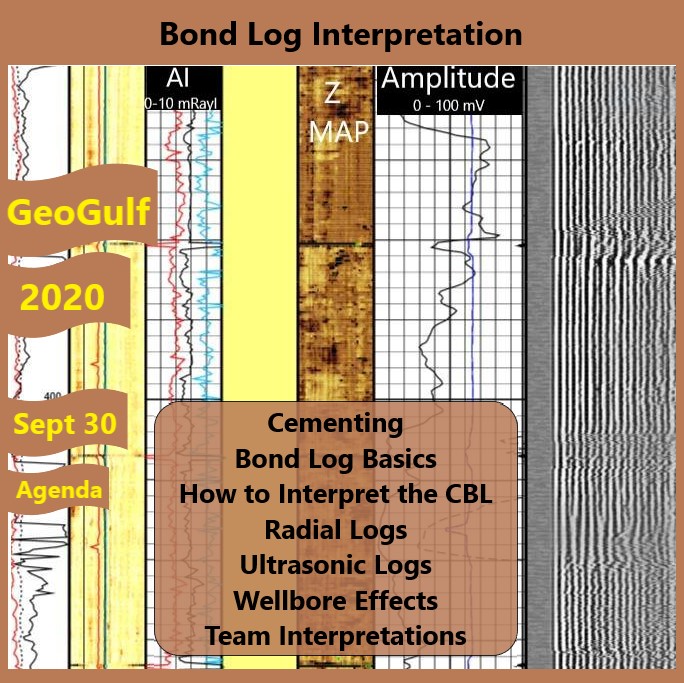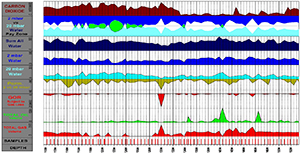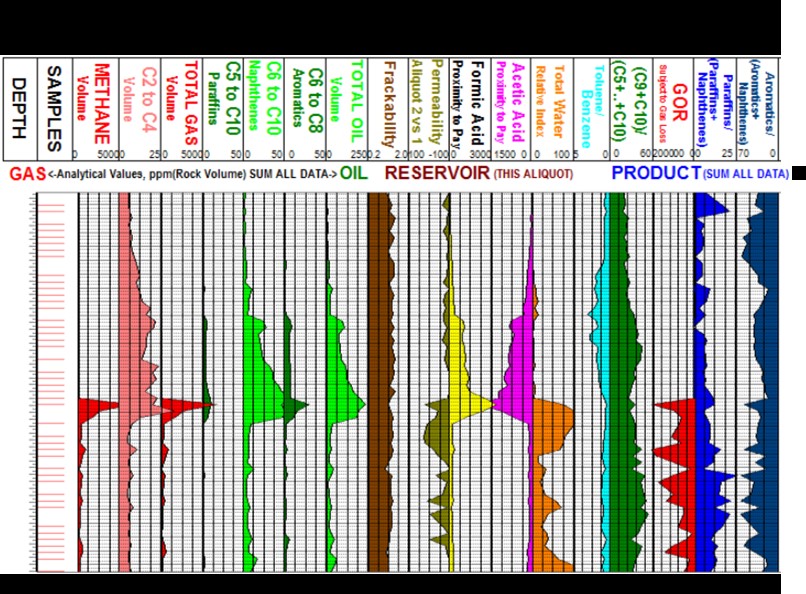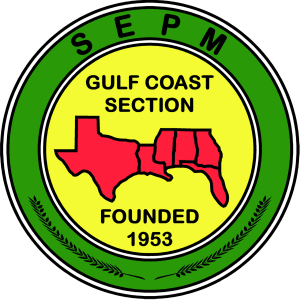
70th GCAGS/GCSSEPM Convention and Exposition
Sept. 30–Oct. 2, 2020 • Lafayette, Louisiana
Hosted by the Lafayette, Baton Rouge, and New Orleans Geological Societies
GeoGulf 2020 Short Courses
Short Course #1 - Cement Bond Logging
Instructor: Kirk Harris, Throughbond LLC
Date & Time: Wednseday, September 30; All Day
Cost: $100 (Professional Registration) and $40 (Student Registration)
Location: Petroleum Club of Lafayette
Maximum: TBA
 Bio: Kirk Harris is the founder and lead technical advisor for ThoroughBond LLC, which provides interpretation services and technology development for cement evaluation logs. Mr. Harris was the global cementing advisor for Oxy and Repsol, and has supervised cementing operations in more than thirty countries. He graduated from Purdue University with a Bachelor’s Degree in Civil Engineering.
Bio: Kirk Harris is the founder and lead technical advisor for ThoroughBond LLC, which provides interpretation services and technology development for cement evaluation logs. Mr. Harris was the global cementing advisor for Oxy and Repsol, and has supervised cementing operations in more than thirty countries. He graduated from Purdue University with a Bachelor’s Degree in Civil Engineering.

Course Description: Although it is often geologists who are the “go to” interpreters for their oil company, cement bond logs affect almost every position in the oil & gas industry. Reading bond logs, therefore, is a useful skill to know and practice.
In the short course, Bond Log Interpretation, the basics of sonic and ultrasonic cased-hole cement evaluation logs are covered, along with a practical five-step interpretation method that will help you accurately read these “often confusing” logs. Advanced methods of observation and interpretation are also explained, and are illustrated with case histories from around the world. The teaching is reinforced with a series of practice interpretations. The objective of this course is to familiarize participants with all types of bond logs, and give them “hands-on” training that can be immediately used in their business.
Course Outline:
- Cementing Basics: A primer on cementing of the wellbore that is to be logged.
- Logging Tools: Introduction to the physics of cased hole cement evaluation logs, both sonic and ultrasonic tools, omni-directional and sector logs.
- Cement Logs: Introduction to the basics of the final log outputs and display.
- Bond Log Interpretation: A specific, simple method to accurately read a cement bond log, introduced and practiced.
- Practical Applications of Reading Bond Logs: A discussion of the connection between the bond log and the isolation of fluids in the constructed wellbore. How to use bond log knowledge to make a positive difference for an oil and gas company.
Short Course #2 - Volatiles Analysis of Cuttings and Core: Advanced Geochemistry by Cryo-Trap Mass Spectrometry on Fresh and Legacy Geological Materials for Oil and Gas Applications
Instructor: Christopher Smith (PhD), Senior Chemist at Advanced Hydrocarbon Stratigraphy
Date & Time: Wednseday, September 30; AM Only
Cost: $60, (Professional Registration), $30, (Student Registration)
Location: Petroleum Club of Lafayette
Maximum: TBA
 Bio: Christopher Smith has been a Senior Chemist with Advanced Hydrocarbon Stratigraphy (AHS) since January 2019 and works in Houston on data analysis, instrumentation, client engagements, and business development. Most of his analysis work focuses on the North Slope in Alaska, the Haynesville in Louisiana, the STACK in Oklahoma, and the Marcellus in West Virginia. Prior to working for AHS, he completed his PhD in analytical chemistry from the University of Arizona in the Winter 2018 term with focuses on instrumentation, data analysis programing, spectroscopy, electrophysiology, surfactants, and surface modification chemistries. He also completed a MA in history at the University of Tulsa as a Henneke Research Fellow in 2012. He completed his undergraduate work cum laude in 2011 with degrees in chemistry, history, and biochemistry also from the University of Tulsa.
Bio: Christopher Smith has been a Senior Chemist with Advanced Hydrocarbon Stratigraphy (AHS) since January 2019 and works in Houston on data analysis, instrumentation, client engagements, and business development. Most of his analysis work focuses on the North Slope in Alaska, the Haynesville in Louisiana, the STACK in Oklahoma, and the Marcellus in West Virginia. Prior to working for AHS, he completed his PhD in analytical chemistry from the University of Arizona in the Winter 2018 term with focuses on instrumentation, data analysis programing, spectroscopy, electrophysiology, surfactants, and surface modification chemistries. He also completed a MA in history at the University of Tulsa as a Henneke Research Fellow in 2012. He completed his undergraduate work cum laude in 2011 with degrees in chemistry, history, and biochemistry also from the University of Tulsa.
Course Description: Short course will focus on the instrumentation, theory, and practical application of the analysis of entrained volatile chemistries in cuttings and core by cryo-trap mass spectrometry (CT-MS). The stratigraphic analysis of these volatiles can provide useful geochemical data applicable from the individual well level to the acreage/basin level. The basics of the instrumentation will be discussed with examples of the components of the instrumentation shown, possibly including a stripped-down analytical platform for use as part of the class (depending on level of interest). The practical theory of the instrumentation and its function will be covered as will various methods of interpreting the volatiles data and relating it to subsurface geochemical processes. Practical applications of the data will be discussed; exercises will be given in the course in terms of utilizing released datasets to evaluate real field applications.

Log presentation of selected tracks of stratigraphic volatiles analysis data from a lateral. This lateral underperformed compared to its offsets with approximately 29% of the average liquids production for its immediate area. Can you identify the major features of present in this lateral and why it underperformed? Can you take that information and suggest an alternative simple engineered completion scheme that would have reduced well costs by 30-35% while maintaining production? You already drilled the hole, but you can still choose how to complete it and understand the petroleum system better going forward.

Log presentation of stratigraphic volatiles analysis data from the vertical section of a lateral well, shallow to the landing zone. A previously unknown oil column and the water leg below it are clearly observed, but something is odd about the composition of the oil, the distribution of the acids, and location of the gases. Can you evaluate it? This is the key to making this play economic.
Short Course #3 - Reservoir Fluids Behavior and Analysis for Earth Scientists
Instructor: Toddy Guidry, Core Laboratories
Date & Time: Wednseday, September 30; PM Only
Cost: $60, (Professional Registration), $30, (Student Registration)
Location: Petroleum Club of Lafayette
Maximum: TBA
 Bio: Toddy is currently Technical Sales Advisor for Core Labs, based in Lafayette La. He also handles sales in the Southeast Gulf Coast region overseeing technical sales and corporate business development east of Texas and is the Core Labs domestic Subject Matter Expert for Reservoir Fluids. Toddy has a MS in Mathematics from the University of Southwestern Louisiana, and has been involved in the industry for over 35 years.
Bio: Toddy is currently Technical Sales Advisor for Core Labs, based in Lafayette La. He also handles sales in the Southeast Gulf Coast region overseeing technical sales and corporate business development east of Texas and is the Core Labs domestic Subject Matter Expert for Reservoir Fluids. Toddy has a MS in Mathematics from the University of Southwestern Louisiana, and has been involved in the industry for over 35 years.
He can be reached in Lafayette at 337-837-8616, toddy.guidry@corelab.com.
.jpg) Course Description: Many times the only exposure a geologist gets to fluids is hearing the reservoir engineer ‘talk’ about getting ‘PVT samples’. This ½ day short course will take a detailed look at fluids behavior, sampling, analysis, production trends and cover experimental methods performed as part of the blueprint for a comprehensive fluids program.
Course Description: Many times the only exposure a geologist gets to fluids is hearing the reservoir engineer ‘talk’ about getting ‘PVT samples’. This ½ day short course will take a detailed look at fluids behavior, sampling, analysis, production trends and cover experimental methods performed as part of the blueprint for a comprehensive fluids program.
The need for good, representative reservoir fluid samples is critical to the effective design and operation of any development project. The decision to build and deploy production facilities exposes producers to millions and even billions of dollars of investment risk, and a solid understanding of formation fluids right after discovery plays an essential part in mitigating that risk. Whether obtaining wireline formation test tool samples from 20,000 feet in deepwater environments or surface separator samples in Louisiana, fluid analysis provides the ammunition needed for more efficient use of assets.
The “big picture” may include many separate investigations, including determining drive mechanisms, formation rock properties, geophysical properties as well as formation fluid properties. Fluids analysis provides data critical to predicting well and reservoir performance, surface and subsea facilities design, and fluid quality assessment for determining market price. These data also can provide vital information on what hardware will be needed, including metallurgy for wells and production facilities, valve sizes and type, maximum flow line length and optimum diameters for subsea tiebacks as well as a host of other factors in development.
Outline of Topics Covered:
Introduction to PVT analysis? Why? When? What? Who?
- Reservoir Engineering 101
- Phase Behavior
- Fluid Properties, Fluid Diagnosis
- Geochemistry, fingerprinting, crude ‘quality’
- Production trends for oil and gas reservoirs
Overview of Sampling Sources
- Surface vs Subsurface
- Pros/Cons of each
- Formation Test Tool sampling
Blueprint for Complete Fluids Program
- Chemistry, Component Analyses, Impurities
- Physical Properties, ‘PVT’ Experiments
- Flow Assurance
- Enhanced Oil Recovery
- Estimating Surface Recoveries
- Mathematics, Modeling etc
- Report formats, “how good” is the data
Bringing it all together – The Real Value of Fluids Analysis
- How is the data used
- Bottomline: Increasing RRR and Decreasing F&D!
Short Course #4 - Machine Learning and AI in Geosciences
Instructor: TBA
Date & Time: Wednseday, September 30; All Day
Cost: $100 (Professional Registration) and $40 (Student Registration)
Location: Petroleum Club of Lafayette
Maximum: TBA
Course Description: TBA

